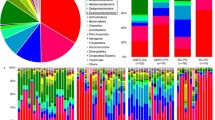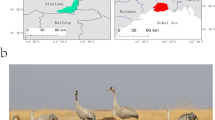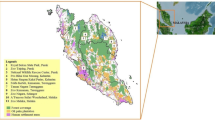Abstract
The animal gut is a dynamic ecosystem. Many factors affect the structure and diversity of the gut microbiota, among which the composition of the diet is a direct determinant. To investigate the effect of dietary components on the gut microbiota of mandarin duck, nine fecal samples were collected from two foraging sites at Shiqian Mandarin Duck Lake National Wetland Park, Guizhou, China. We analyzed the chloroplast rbcL gene, mitochondrial COI gene, and 16S rRNA gene from the total DNA of the fecal samples by high-throughput sequencing to identify plant and animal components of the diet and the composition of the gut microbiota of mandarin duck. We found that the gut microbiota composition was significantly correlated with the number of species in the diet. Mandarin ducks with more diverse diets had a more complex gut microbiota with fewer pathogenic bacteria. This study provides further theoretical support for the effect of dietary differences on the structure of the host gut microbiota and clarifies the feeding preferences of mandarin duck in breeding areas.




Similar content being viewed by others
References
Allison MS, Andrea BA, Anna AP, Philip CS, Sabrina ST (2022) Metabarcoding of stomach contents and fecal samples provide similar insights about seaside sparrow diet. Ornithol Appl 124(1):duab060. https://doi.org/10.1093/ornithapp/duab060
Ando H, Setsuko S, Horikoshi K, Suzuki H, Umehara S, Inoue-Murayama M, Isagi Y (2013) Diet analysis by next-generation sequencing indicates the frequent consumption of introduced plants by the critically endangered red-headed wood pigeon (Columba janthina nitens) in oceanic island habitats. Ecol Evol 3(12):4057–4069. https://doi.org/10.1002/ece3.773
Bergogne-Bérézin E (2014) Bacteria: acinetobacter encyclopedia of food safety. Academic press, Cambridge, pp 337–341. https://doi.org/10.1016/B978-0-12-378612-8.00084-6
Bermudez BM, Faas MM, de Vos P (2016) Modulation of dendritic-epithelial cell responses against sphingomonas paucimobilis by dietary fibers. Sci Rep 6:30277. https://doi.org/10.1038/srep30277
Bolotin A, Wincker P, Mauger A, Jaillon O, Malarme K, Weissenbach J, Ehrlich SD, Sorokin A (2001) The complete genome sequence of the lactic acid bacterium Lactococcus lactis ssp. lactis IL1403. Genome Res 11(5):731–753. https://doi.org/10.1101/gr.gr-1697
Bolyen E, Rideout JR, Dillon MR, Bokulich NA, Caporaso JG (2018) QIIME 2: reproducible, interactive, scalable, and extensible microbiome data science. PeerJ Prepr 6:e27295v2. https://doi.org/10.7287/peerj.preprints.27295v2
Briones-Roblero CI, Rodriguez-Diaz R, Santiago-Cruz JA, Zuniga G, Rivera-Orduna FN (2017) Degradation capacities of bacteria and yeasts isolated from the gut of Dendroctonus rhyzophagus (curculionidae Scolytinae). Folia Microbiol 62(1):1–9. https://doi.org/10.1007/s12223-016-0469-4
Brown DS, Burger R, Cole N, Vencatasamy D, Clare EL, Montazam A, Symondson WOC (2013) Dietary competition between the alien asian musk shrew (Suncus murinus) and a re-introduced population of telfair’s skink (Leiolopisma telfairii). Mol Ecol 23(15):3695–3705. https://doi.org/10.1111/mec.12445
Callahan BJ, McMurdie PJ, Rosen MJ, Han AW, Johnson AJA, Holmes SP (2016) DADA2: high-resolution sample inference from illumina amplicon data. Nat Methods 13:581–583. https://doi.org/10.1038/nmeth.3869
Chase MW, Cowan RS, Hollingsworth PM, Berg CVD, Wilkinson MJ (2007) A proposal for a standardised protocol to barcode all land plants. Taxon 56:295–299. https://doi.org/10.1002/tax.562004
Couch CE, Stagaman K, Spaan RS, Combrink HJ, Sharpton TJ, Beechler BR, Jllles AE (2021) Diet and gut microbiome enterotype are associated at the population level in African buffalo. Nat Commun 12:2267. https://doi.org/10.1038/s41467-021-22510-8
Daquila BV, Scudeler EL, Cleisto F, Dossi A, Dossi F (2019) Action of Bacillus thuringiensis (bacillales: Bacillaceae) in the midgut of the sugarcane borer Diatraea saccharalis (fabricius, 1794) (lepidoptera: Crambidae). Ecotoxicol Environ Saf 184:109642. https://doi.org/10.1016/j.ecoenv.2019.109642
Desantis TZ, Hugenholtz P, Larsen N, Rojas M, Brodie EL, Keller K, Huber T, Dalevi D, Hu P, Andersen GL (2006) Greengenes, a chimera-checked 16S rRNA gene database and workbench compatible with ARB. Appl Environ Microbiol 72:5069–5072. https://doi.org/10.1128/AEM.03006-05
Devillard E, Goodheart DB, Karnati SK, Bayer EA, Lamed R, Miron J, Nelson KE, Morrison M (2004) Ruminococcus albus 8 Mutants defective in cellulose degradation are deficient in two processive endocellulases, Cel48A and Cel9B, both of which possess a novel modular architecture. J Bacteriol 186(1):136–145. https://doi.org/10.1128/JB.186.1.136-145.2004
Devriese L, Baele M, Butaye P (2006) The genus enterococcus. Prokaryotes. https://doi.org/10.1007/0-387-30744-35
Elliott TL, Jonathan DT (2014) Challenges to barcoding an entire flora. Mol Ecol Resour 14:883–891. https://doi.org/10.1111/1755-0998.12277
Erickson DL, Elizabeth R, Padmini R, Bourg NA, Mcshea WJ, Andrea O (2017) Reconstructing a herbivore’s diet using a novel rbcl dna mini-barcode for plants. AoB Plants. https://doi.org/10.1093/aobpla/plx015
Erwan Q, Hibert F, Miquel C, Lhuillier E, Rasolondraibe E, Champeau J, Rabarivola C, Nusbaumer L, Chatelain C, Gautier L (2013) A dna metabarcoding study of a primate dietary diversity and plasticity across its entire fragmented range. PLoS ONE 8(3):e58971. https://doi.org/10.1371/journal.pone.0058971
Fang ZY (2019) Population dynamics and overwintering habitat selection of Mandarin duck(Aix galericulata) in Shiqian Mandarin duck lake, Guizhou province. Guizhou: Guizhou University. https://doi.org/10.11934/j.issn.1673-4831.2016.03.021
Flint HJ, Bayer EA, Rincon MT, Lamed R, White BA (2008) Polysaccharide utilization by gut bacteria: potential for new insights from genomic analysis. Nat Rev Microbiol 6(2):121–131. https://doi.org/10.2307/3432760
Fndriks L (2017) Roles of the gut in the metabolic syndrome: an overview. J Int Med 281:319–336. https://doi.org/10.1111/joim.12584
Ford MJ, Jennifer H, Bradley HM, Ayres KL, Baird RW, Emmons CK, Lundin JI, Schorr GS, Wasser SK, Park LK (2016) Estimation of a killer whale (Orcinus orca) population’s diet using sequencing analysis of dna from feces. PLoS ONE 11(1):e0144956. https://doi.org/10.1371/journal.pone.0144956
Fu R, Xiang X, Dong Y, Cheng L, Zhou L (2020) Comparing the intestinal bacterial communies of sympatric wintering hooded crane (Grus monacha) and domestic goose (Anser anser domesticus). Avian Res. https://doi.org/10.1186/s40657-020-00195-9
Galan M, Pons JB, Tournayre O, Pierre É, Leuchtmann M, Pontier D, Charbonnel N (2017) Metabarcoding for the parallel identification of several hundred predators and their preys: application to bat species diet analysis. Mol Ecol Resour. https://doi.org/10.1111/1755-0998.12749
Gao GL, Zhao XZ, Li Q, He C, Zhao WJ, Liu SY, Ding JM, Ye WX, Wang J, Chen Y, Wang HW, Li J, Luo Y, Su J, Huang Y, Liu ZH, Dai RH, Shi YX, Meng H, Wang QG (2016) Genome and metagenome analyses reveal adaptive evolution of the host and interaction with the gut microbiota in the goose. Sci Rep 6:32961. https://doi.org/10.1038/srep32961
Garcıa-Robledo C, Erickson DL, Staines CL, Erwin TL, Kress WJ, Heil M (2013) Tropical plant-herbivore networks: reconstructing species interactions using DNA barcodes. PLoS ONE 8:e52967. https://doi.org/10.1371/journal.pone.0052967
Geller J, Meyer C, Parker M, Hawk H (2013) Redesign of PCR primers for mitochondrial cytochrome c oxidasesubunit I for marine invertebrates and application in all-taxa biotic surveys. Mol Ecol Resour 13(5):851–861. https://doi.org/10.1111/1755-0998.12138
Gong Y, Nehafta BB, Wang HH (2018) Nest usurpation between Mandarin duck Aix galericulata and coexisting bird species in nest boxes in a secondary forest Zuojia nature reserve China. Pakistan J. Zool 50:1537–1540. https://doi.org/10.17582/journal.pjz/2018.50.4.sc2
Grond K, Lanctot RB, Jumpponen A, Sandercock BK (2017) Recruitment and establishment of the gut microbiome in arctic shorebirds. FEMS Microbiol Ecol 93:142. https://doi.org/10.1093/femsec/fix142
Guo T, Li M, Sun X, Wang Y, Yang L, Jiao H, Li G (2021) Synergistic activity of capsaicin and colistin against colistin-resistant Acinetobacter baumannii: In vitro/vivo efficacy and mode of action. Front Pharmacol 12:744494. https://doi.org/10.3389/fphar.2021.744494
Hofreiter M, Poinar HN, Spaulding WG, Bauer K, Martin PS, Possnert G, Pääbo S (2000) A molecular analysis ofground sloth diet through the last glaciation. Mol Ecol 9(12):1975–1984. https://doi.org/10.1046/j.1365-294x.2000.01106.x
Hollingsworth PM, Forrest LL, Spouge JL, Hajibabaei M, Little DP (2009) A DNA barcode for land plants. Proc Natl Acad Sci USA 106:12794–12797. https://doi.org/10.1073/pnas.0905845106
Hooper LV, Gordon J (2001) Molecular analysis of commensal host-microbial relationships in the intestine. Science 291(5505):881–884. https://doi.org/10.1126/science.291.5505.881
Iglewski BH(1996) Pseudomonas. Medical Microbiology. 4th edition. Galveston (TX): University of Texas Medical Branch at Galveston. Chapter 27. https://www.ncbi.nlm.nih.gov/books/NBK8326/
Illiano P, Brambilla R, Parolini C (2020) The mutual interplay of gut microbiota, diet and human disease. Febs J 23:1–23. https://doi.org/10.1111/febs.15217
Jinendiran S, Nathan AA, Ramesh D, Vaseeharan B, Sivakumar N (2018) Modulation of innate immunity, expression of cytokine genes and disease resistance against Aeromonas hydrophila infection in goldfish (Carassius auratus) by dietary supplementation with Exiguobacterium acetylicum S01. Fish Shellfish Immun 84:458–469. https://doi.org/10.1016/j.fsi.2018.10.026
Kataoka H, Koita N, Ito Kondo N, Ito HC, Nakajima M, Momose K, Iima H, Yoshino T, Amano T, Kitazawa T, Endoh D, Nakajima N, Teraoka H (2022) Metabarcoding of feces and intestinal contents to determine carnivorous diets in red-crowned cranes in eastern Hokkaido Japan. J Vet Med Sci 84(3):358–367. https://doi.org/10.1292/jvms.21-0516
Ke A, Parreira VR, Goodridge L, Farber JM (2021) Current and future perspectives on the role of probiotics, prebiotics, and synbiotics in controlling pathogenic cronobacter spp. in infants. Front Microbiol 12:3158. https://doi.org/10.3389/fmicb.2021.755083
Keshavarzian A, Green SJ, Engen PA, Voigt RM, Naqib A, Forsyth CB, Mutlu E, Shannon KM (2015) Colonic bacterial composition in Parkinson’s disease. Mov Disord 30(10):1351–1360. https://doi.org/10.1002/mds.26307
Koutsoumanis KP, Lianou A, Sofos JN (2014) Food safety: emerging pathogens encyclopedia of agriculture and food systems. Academic press, Cambridge, pp 250–272
Kwon JH, Noh YK, Lee DH, Yuk SS, Erdene-Ochir TO, Noh JY, Hong WT, Jeong JH, Jeong S, Gwon GB (2017) Experimental infection with highly pathogenic h5n8 avian influenza viruses in the mandarin duck (Aix galericulata) and domestic pigeon (Columba livia domestica). Vet Microbiol 203:95–102. https://doi.org/10.1016/j.vetmic.2017.03.003
Langille MGI, Zaneveld J, Caporaso JG, McDonald D, Dan K, Reyes JA, Clemente JC, Burkepile DE, Thurber RLV, Knight R (2013) Predictive functional profiling of microbial communities using 16S rRNA marker gene sequences. Nat Biotechnol 31:814–821. https://doi.org/10.1038/nbt.2676
Lee CK, Barbier BA, Bottos EM, McDonald IR, Cary SC (2012) The inter-valley soil comparative survey: the ecology of dry valley edaphic microbial communities. ISME J 6(5):1046–1057. https://doi.org/10.1038/ismej.2011.170
Leray M, Yang JY, Meyer CP, Mills SC, Agudelo N, Ranwez V, Boehm JT, Machida RJ (2013) A new versatile primer set targeting a short fragment of the mitochondrial COI region for metabarcoding metazoan diversity: application for characterizing coral reef fish gut contents. Front Zool 10(1):1–14. https://doi.org/10.1186/1742-9994-10-34
Li YB, Zhang ZP, Yuan Y, Huang HC, Mei XY, Du F, Yang M, Liu YX, Zhu SS (2022) Appropriate soil heat treatment promotes growth and disease suppression of panax notoginseng by interfering with the bacterial community. J Microbiol Biotechnol 32(3):294–301. https://doi.org/10.4014/jmb.2112.12005
Liu G, Ning Y, Xia XF, Gong MH (2018) Application of high-throughput sequencing technology in the analysis of wild animal feeding habits. Acta Zool Sinica 38(09):3347–3356. https://doi.org/10.1360/052011-634
Matos R, Taillieu E, De Bruyckere S, De Witte C, Rêma A, Santos-Sousa H, Nogueiro J, Reis CA, Carneiro F, Haesebrouck F, Amorim I, Gärtner F (2022) Presence of helicobacter species in gastric mucosa of human patients and outcome of helicobacter eradication treatment. J Pers Med 12(2):181. https://doi.org/10.3390/jpm12020181
Michel AJ, Ward LM, Goffredi SK, Dawson KS, Baldassarre DT, Brenner A, Gotanda KM, McCormack JE, Mullin SW, Neill AO, Tender GS, Uy JAC, Yu K, Orphan VJ, Chaves JA (2018) The gut of the finch: uniqueness of the gut microbiome of the galápagos vampire finch. Microbiome 6(1):167. https://doi.org/10.1186/s40168-018-0555-8
Mikaelvan A, Dietrich C, Kohler T, Poulsen M, Sillam-Dussès D, Brune A (2015) Diet is the primary determinant of bacterial community structure in the guts of higher termites. Mol Ecol 24:5284–5295. https://doi.org/10.1111/mec.13376
Perofsky AC, Lewis RJ, Meyers LA (2019) Terrestriality and bacterial transfer: a comparative study of gut microbiomes in sympatric Malagasy mammals. ISME J 13:50–63. https://doi.org/10.1038/s41396-018-0251-5
Rognes T, Flouri T, Nichols B, Quince C, Mahé F (2016) VSEARCH: a versatile open source tool for metagenomics. PeerJ 4:e2584. https://doi.org/10.7717/peerj.2584
Sáez-Nieto JA, Medina-Pascual MJ, Carrasco G, Garrido N, Fernandez-Torres MA, Villalón P, Valdezate S (2017) Paenibacillus spp. isolated from human and environmental samples in Spain: detection of 11 new species. New Microbes New Infect. 19:19–27. https://doi.org/10.1016/j.nmni.2017.05.006
Sahiner U, Akdis M, Akdis CA (2022) Introduction to mechanisms of allergic diseases. Allergy essentials, 2nd edn. Elsiver, Amsetdeam, pp 1–24. https://doi.org/10.1016/B978-0-323-80912-2.00001-9
Sanders JG, Beichman AC, Roman J, Scott JJ, Emerson D, McCarthy JJ, Girguis PR (2015) Baleen whales host a unique gut microbiome with similarities to both carnivores and herbivores. Nat Commun 6:8285. https://doi.org/10.1038/ncomms9285
Schnupf P, Sansonetti PJ (2019) Shigella pathogenesis: new insights through advanced methodologies. Microbiol Spectr. https://doi.org/10.1128/microbiolspec.BAI-0023-2019
Semova I, Carten JD, Stombaugh J, Mackey LC, Knight R, Farber SA, Rawls JF (2012) Microbiota regulate intestinal absorption and metabolism of fatty acids in the Zebrafish. Cell Host Microbe 12(3):277–288. https://doi.org/10.1016/j.chom.2012.08.003
Spor A, Koren O, Ley R (2011) Unravelling the effects of the environment and host genotype on the gut microbiome. Nat Rev Microbiol 9(4):279–290. https://doi.org/10.1038/nrmicro2540
Sullins DS, Haukos DA, Craine JM, Lautenbach JM, Robinson SG, Lautenbach JD, Kraft JD, Plumb RT, Reitz JH, Sandercock BK, Fierer N (2018) Identifying the diet of a declining prairie grouse using DNA metabarcoding. Auk 135(3):583–608. https://doi.org/10.1642/Auk-17-199.1
Taberlet P, Coissac E, Pompanon F, Brochmann C, Willerslev E (2012) Towards next-generation biodiversity assessment using DNA metabarcoding. Mol Ecol 21(8):2045–2050. https://doi.org/10.1038/nrmicro2540
Tap J, Mondot S, Levenez F, Pelletier E, Caron C, Furet JP, Leclerc M (2009) Towards the human intestinal microbiota phylogenetic core. Environ Microbiol 11(10):2574–2584. https://doi.org/10.1111/j.1462-2920.2009.01982.x
Titulaer M, Melgoza-Castillo A, Panjabi AO, Sanchez-Flores A, Fernández JA (2017) Molecular analysis of stomach contents reveals important grass seeds in the winter diet of bairds and grasshopper sparrows, two declining grassland bird species. PLoS ONE 12(12):e0189695. https://doi.org/10.1371/journal.pone.0189695
Turnbull PCB(1996). Bacillus. Medical Microbiology. 4th edition. Galveston (TX): University of Texas Medical Branch at Galveston. Chapter 15. https://www.ncbi.nlm.nih.gov/books/NBK7699/
Waite DW, Taylor MW (2014) Characterizing the avian gut microbiota: membership, driving influences, and potential function. Front Microbiol 5:223. https://doi.org/10.3389/fmicb.2014.00223
Wang W, Wang F, Li L, Wang A, Shi Y (2020) Characterization of the gut microbiome of black-necked cranes (Grus nigricollis) in six wintering areas in China. Arch Microbiol 202(5):983–993. https://doi.org/10.1007/s00203-019-01802-0
Wu Y, Yang Y, Cao L, Yin H, Xu M, Wang Z, Liu Y, Wang X, Deng Y (2018) Habitat environments impacted the gut microbiome of long-distance migratory swan geese but central species conserved. Sci Rep 8(1):13314. https://doi.org/10.1038/s41598-018-31731-9
Xie Y, Xia P, Wang H, Yu H, Giesy JP, Zhang Y, Mora MA, Zhang X (2016) Efects of captivity and artifcial breeding on microbiota in feces of the red-crowned crane (Grus japonensis). Sci Rep 6:33350. https://doi.org/10.1038/srep33350
Yang Y, Deng Y, Cao L (2016) Characterising the interspecific variations and convergence of gut microbiota in Anseriformes herbivores at wintering areas. Rep 6:32655. https://doi.org/10.1038/srep32655
Zhao G, Zhou L, Dong Y, Cheng Y, Song Y (2017a) The gut microbiome of hooded cranes (Grus monacha) wintering at Shengjin lake, China. Microbiologyopen 6(3):e00447. https://doi.org/10.1002/mbo3.447
Zhao YL, Chen MY, Miao N, Timothy (2017b) A study on seasonal variation diet of five most common resident bird species in Wangjiang campus of Sichuan university Chengdu. Sichuan J Zool 36(05):576–581. https://doi.org/10.11984/j.issn.1000-7083.20160218
Zhi YJ, Shao MQ, Cui P, Chen B (2019) Time budget and activity rhythm of the Mandarin duck Aix galericulata in the Poyang lake watershed. Pakistan J. Zool 51:725–730. https://doi.org/10.17582/journal.pjz/2019.51.2.725.730
Acknowledgements
This work was supported by the Guizhou Provincial Science and Technology Foundation (Grant No. Qiankehe jichu[2020] 1Y080), the Joint Fund of the National Natural Science Foundation of China and the Karst Science Research Center of Guizhou province (Grant No. U1812401), the National Natural Science Foundation of China (Grant No. 31801990; 32160126), and the College-county cooperation project (Grant No. 11904/0518168).
Funding
Funding was provided by the Natural Science Foundation of Guizhou Province, Qiankehe LH[2020] 1Y080, yeying Wang,Innovative Research Group Project of the National Natural Science Foundation of China, 31801990.
Author information
Authors and Affiliations
Contributions
All authors participated in the experimental design. Dan Zhu and Jinsong Wu collected the feces of mandarin ducks. Binqiang Li and Haofeng Zhan performed the DNA extraction, PCR amplification, data collection, and analysis. Yeying Wang and Xiaoyan Lv wrote the original draft of the manuscript. Canshi Hu edited and reviewed the manuscript. All authors read and approved the final manuscript.
Corresponding author
Ethics declarations
Conflict of interest
The authors declare that they have no conflict of interest.
Additional information
Communicated by Erko Stackebrandt.
Publisher's Note
Springer Nature remains neutral with regard to jurisdictional claims in published maps and institutional affiliations.
Rights and permissions
Springer Nature or its licensor (e.g. a society or other partner) holds exclusive rights to this article under a publishing agreement with the author(s) or other rightsholder(s); author self-archiving of the accepted manuscript version of this article is solely governed by the terms of such publishing agreement and applicable law.
About this article
Cite this article
Wang, Y., Lv, X., Zhan, H. et al. Effect of diet on gut microbiota diversity in mandarin ducks (Aix galericulata) revealed by Illumina high-throughput sequencing. Arch Microbiol 204, 725 (2022). https://doi.org/10.1007/s00203-022-03333-7
Received:
Revised:
Accepted:
Published:
DOI: https://doi.org/10.1007/s00203-022-03333-7




